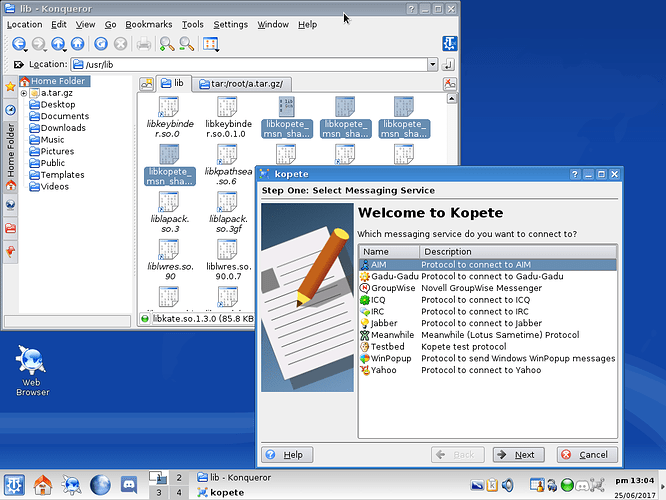After seeing this post about modding aMSN, I decided to see if I could use the KDE 3.5 version of Kopete to connect to the Escargot server.
TL-DR: While I can change the actual server URL, both Kopete and Pidgin still try to authenticate using the Microsoft servers, instead of Escargot’s “nexus-mock”, which results in certificate errors because both clients are being redirected from the old .NET Passport server to the Microsoft Account server.
First off, I know that the KDE 3.5 version of Kopete is able for newer Linux distros as part of the Trinity Desktop project. However, expectedly enough, the Trinity version doesn’t have Messenger support (even after copying the Messenger plugin libraries to both /usr/lib and /opt/trinity/lib), as you’ll see below.
(If you were wondering, I used that VM to practice what I wanted to have installed on my desktop PC’s Linux partition)
Anyways, I went into my Slackware 12.2 VM (because that’s the only distro I know of that includes a completely stock KDE 3.5.10 setup) and tried Kopete in there (that’s where I ripped the Messenger plugin libraries from), and it does have the MSN Messenger plugin.
There was an option to change the server, however, that does not change the authentication server, and I can’t change it (without modifying the source code) to use Escargot’s “nexus-mock”. This results in both Kopete and Pidgin getting certificate errors when trying to connect.
(I was going to put a screenshot here, but I don’t feel like doing so. It’s just a “certificate error” when trying to connect to “nexus.passport.com”)
I won’t bore you with the Pidgin 2.4.1 screenshots because that’s a similar story, but Pidgin is available for Windows as well. However, as of their 2.12.0 version, they expectedly enough dropped Messenger support, but because it’s open source, I’m sure someone could mod Pidgin’s MSN Messenger plugin to connect to the Escargot servers.
(I would mod either one of them but I’m very bad at programming, and the rest is a long story I won’t bore you with)
